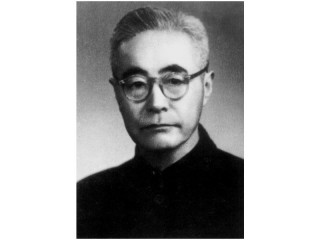
Ku Chieh-kang biography
Date of birth : 1893-05-08
Date of death : 1980-12-25
Birthplace : Suzhou, Jiangsu, Qing Empire
Nationality : Chinese
Category : Historian personalities
Last modified : 2011-10-12
Credited as : Golden Age, historian, Gu Jiegang
The Chinese historian Ku Chieh-kang (1893-1980), by subjecting the Chinese classics to critical analysis, undermined the notion of a "Golden Age" that had given authority to the orthodox Confucian view of history. In addition to his studies of Chinese ancient history, Ku published works on folklore, historical geography, and the ethnography of China's frontiers. His name is also romanized as Gu Jiegang.
Ku Chieh-kang was born into Suzhou scholar-gentry on May 8, 1893 in Soochow. He was steeped in the classical tradition from an early age. His grandfather conveyed to him the written tradition of Han learning, and his grandmother filled his ears with local folklore. Young Ku approached the classics with a critical frame of mind, even when his unorthodox ideas meant the loss of a high school scholarship. In 1913 Ku entered the preparatory school of National Beijing University (Peita) and subsequently became
a student at this center of Chinese intellectual life. He became a devotee of the classical theater, further stimulating his interest in the transmission of oral traditions.
During Ku's years at Peita, the university became the center of the New Thought movement and the focal point of wide-ranging intellectual and ideological controversy. Though a student of the famous philologist Chang Ping-lin, Ku was drawn to the more radical scholarship of K'ang Yuwei, who rejected the traditional interpretation of the classics. However, Ku disagreed with K'ang's interpretation of Confucius as a radical social reformer.
In his seminal studies, Ku questioned traditional interpretations of Chinese history. He argued that anachronisms perpetuated by the ruling elite hindered China's ability to develop. According to Laurence Schneider in Ku Chiehkang and China's New History, Ku passionately believed that a true understanding of China's past would help China's future; "With accurate knowledge about the past, the 'real' identity of China, past, present, and future, could then be determined."
The closest friend of Ku was Hu Shih, who, like Ku, championed a critical, scientific scholarship free from political constraints. His correspondence with Hu and another contemporary scholar, Qian Xuantong, led to the publication (1926-1941) of the seven-volume Kushih pien, discussions on Chinese ancient history. Ku edited four volumes of this monumental reinterpretation of China's ancient past in which he demonstrated his thesis that the earliest traditions of China's "Golden Age" were precisely those that had been invented last. In 1936 Ku wrote, "We have been as though in a dream in regard to our past, the Golden Age." Kushih pien stimulated a passionate discussions in intellectual circles and many scholars accepted Ku's trailblazing ideas as basic history.
Ku's career as a teacher began after he graduated from Peita in 1920. In 1922 his grandmother's illness brought him back to Soochow, and, until the spring of 1924, he served as editor in Chinese history for the Commercial Press in nearby Shanghai. The next two years were happy ones for Ku, immersed in the unparalleled resources of the Peita library, but personal and political reasons compelled him to leave once again, this time for Amoy University. There he crossed swords with the acid-penned writer Lu Hsün, who immortalized him in a short story as "Mr. Birdhead."
Ku then went to National Chung-shan (Sun Yat-sen) University in Canton and, in 1929, to Yenching University in Peking. Until 1937 Ku remained at Yenching teaching, directing research, and editing a learned journal and a popular periodical of a nationalistic, anti-Japanese persuasion. One of Ku's interests had been China's borderlands and their ethnographic make-up. When the Japanese attacked in July of 1937, he fled to the far northwestern provinces of Kansu and Tsinghai, where he conducted a study of educational problems and wrote anti-Japanese propaganda. He also spent time writing patriotic folk songs. He then moved on to Chungking. From September of 1938 to the end of the war in 1945, Ku remained in the wartime capital, continuing his scholarly activities as head of the Institute of Chinese Cultural Studies at Ch'i-lu University. After the war he seems to have taught for a time at Chentan University in Shanghai.
In his writings about antiquity Ku had expressed disdain for scholars who served as tools of political elites. However, his fierce nationalism and his tendency to interpret ideas as expressions of class interests may have led him to support the Communists, although he was not a Marxist. After 1949 he became a research fellow at the Academia Sinica and published in collaborative works with other scholars and occasionally took part in political conferences. He assumed a number of honorary academic and political posts, including positions in the Chinese Historical Society and the Fourth and Fifth Peoples' Congress. However, throughout the 1950s, Ku refrained from engaging in debates on Chinese history. In his latter years, Ku accepted a prominent position at the history department of the newly founded Chinese Academy of Social Sciences in Beijing. In 1962 Ku published an index of Shangshu, a culmination of research on the Shangshu, which he first began as a young scholar. He died in Beijing on December 25, 1980.
Ku's preface to the Ku-shih pien was translated by Arthur W. Hummel and published as The Autobiography of a Chinese Historian (1931). The major biography is Laurence A. Schneider, Ku Chieh-kang and China's New History (1971). A short biographical sketch is contained in Howard L. Boorman, Biographical Dictionary of Republican China, vol. 2 (1968). Ku's obituary and a short biography is found in Journal of Asian Studies XLI, no. 2 (February 1982). □
















